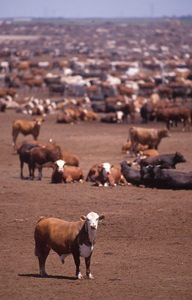Factory farms focus on producing cheap food for huge profit gains. This comes with severe environmental and animal welfare costs that are not accounted for in the price of the meat product.
 |
Agricultural Project, Flickr |
Conventional beef production has one of the largest impacts on global natural resources. It threatens clean air and water, and produces massive amounts of greenhouse gas emissions that contribute to climate change. Even grazing cattle on public lands destroy soils and riparian ways, disrupting wild ecosystems. Producing feed for conventional livestock is also linked to increased use of toxic pesticides and monoculture that destroys habitat and contributes to pollution. It is important to remember that the price of cheap meat is significantly higher than one pays at the grocery checkout.
Meat production does not need to be this harmful to the environment; industrialized practices and mindsets are responsible for much of this damage.
In contrast, organic, regenerative practices utilize management techniques that combat climate change and support local environments. You can read more about this in the Rodale article below.
Cornucopia encourages meat-eating consumers to buy from organic, grass-fed producers. Look for local, family-scale operations that use smart grazing techniques, such as pasture rotation, to support the health of the land and water.
IS MEAT RUINING THE PLANET?
Rodale Institute
In the last few decades, factory farms have taken over the global meat supply. These consolidated, large-scale operations each raise hundreds to thousands of animals every year. Their focus is on maximum production at the cheapest cost—and that comes at the expense of animal welfare and environmental health.
The prevalence of factory farms has increased as demand for meat and milk has grown across the globe, and that trend continues. Particularly as incomes increase in developing countries, so will demand for animal products. By 2050, global meat and dairy production is projected to increase more than 150%.
Can our planet handle the burden? In 2017, the EPA reported that agriculture contributed nearly 10% of all greenhouse gas emissions, and livestock accounted for a full third of that. Animal feed production and processing contributes the bulk of those emissions, with manure next in line. It’s no secret that factory farming methods harm our air, water, and soil.
However, it’s a myth that animal agriculture has to be destructive or that we have to stop eating meat to save the planet.
It’s not the cow, it’s the how.

